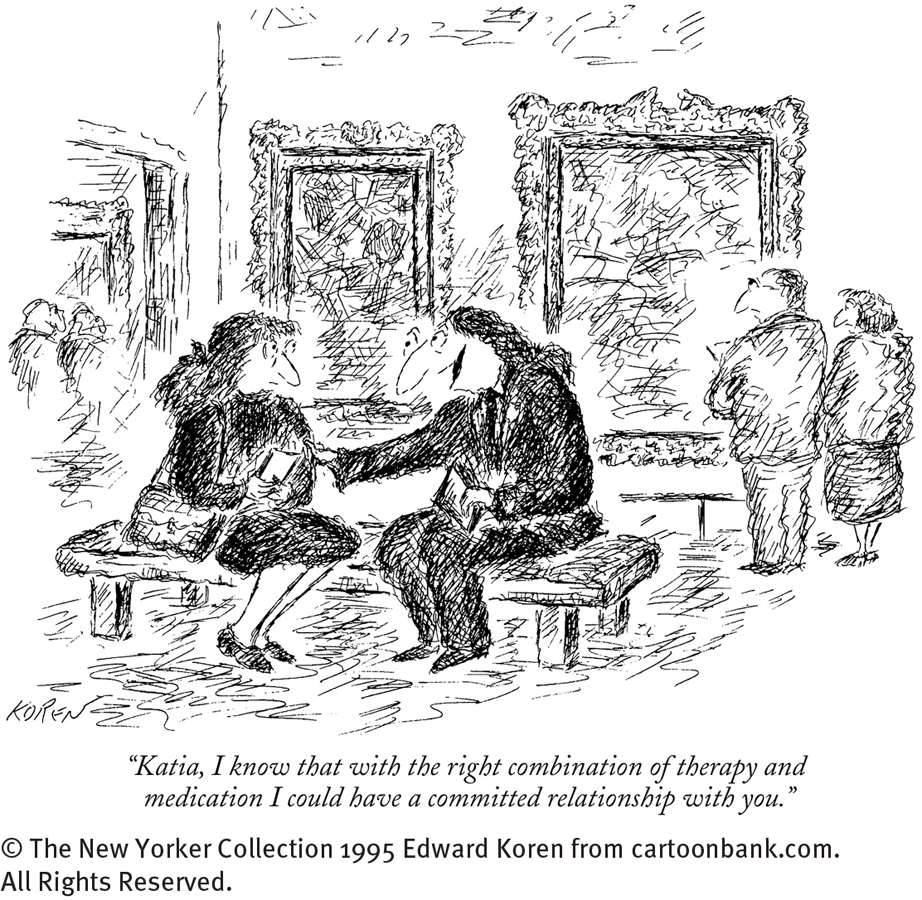8.3 PUTTING IT...together
With Success Come New Questions
Depressive and bipolar disorders are among the most treatable of all psychological disorders. The choice of treatment for bipolar disorders is narrow and simple: drug therapy, perhaps accompanied by psychotherapy, is the single most successful approach. The picture for unipolar depression is more varied and complex, although no less promising. Cognitive, cognitive-

Why are several very different approaches highly effective in the treatment of unipolar depression? Two explanations have been proposed. First, if many factors contribute to unipolar depression, it is plausible that the removal of any one of them could improve all areas of functioning. In fact, studies have sometimes found that when one kind of therapy is effective, clients tend to function better in all spheres. When certain antidepressant drugs are effective, for instance, clients make the same improvements in their thinking and social functioning that cognitive and interpersonal therapy would bring about (Meyer et al., 2003; Weissman, 2000).
A second explanation suggests that there are various kinds of unipolar depression, each of which responds to a different kind of therapy. There is evidence that interpersonal psychotherapy is more helpful in depressions brought on by social problems than in depressions that seem to occur spontaneously (Frank & Levenson, 2011; Weissman & Markowitz, 2002). Similarly, antidepressant medications seem more helpful than other treatments in cases marked by appetite and sleep problems, sudden onset, and a family history of depression (McNeal & Cimbolic, 1986).
Whatever the ultimate explanation, the treatment picture is very promising both for people with unipolar depression and for those with bipolar disorders. The odds are that one or a combination of the therapies now in use will relieve their symptoms. Yet the sobering fact remains that as many as 40 percent of people with a mood disorder do not improve under treatment and must suffer their mania or depression until it has run its course.
BETWEEN THE LINES
Top of the Mountain
Antidepressant medications are now the most commonly prescribed class of drugs, ahead of drugs for high blood pressure, high cholesterol, asthma, or headaches (McGrath, 2011; Cohen, 2007).
BETWEEN THE LINES
Publication Bias
A review of 74 FDA-
SUMMING UP
TREATMENTS FOR DEPRESSIVE AND BIPOLAR DISORDERS More than 60 percent of people with depressive and bipolar disorders can be helped by treatment. pp. 253–
254 TREATMENTS FOR UNIPOLAR DEPRESSION Various treatments have been used with unipolar depression. Psychodynamic therapists try to help depressed clients become aware of and work through their real or imagined losses and their excessive dependence on others. Behavioral therapists re-
introduce clients to events and activities that they once found pleasurable, reinforce nondepressive behaviors, and teach interpersonal skills. Cognitive therapists help depressed clients identify and change their dysfunctional cognitions, and cognitive- behavioral therapists try to reduce clients’ depression by combining cognitive and behavioral techniques.Sociocultural theorists trace unipolar depression to interpersonal, social, and cultural factors. One family-
social approach, interpersonal psychotherapy, is based on the premise that depression stems from social problems, and so therapists try to help clients develop insight into their interpersonal problems, change them and the conditions that are causing them, and learn skills to protect themselves in the future. Another family- social approach, couple therapy, may be used when depressed people are in a dysfunctional relationship. Page 281Most biological treatments consist of antidepressant drugs, but electroconvulsive therapy (ECT) is still used to treat some severe cases of depression, and several brain stimulation techniques recently have been developed to treat severely depressed patients who are unresponsive to all other forms of treatment. ECT remains a controversial procedure, although it is a fast-
acting intervention that is particularly effective when depression is severe, unresponsive to other kinds of treatment, or characterized by delusions. Antidepressant drugs include three classes: MAO inhibitors, tricyclics, and second- generation antidepressants. MAO inhibitors block the degradation of norepinephrine, allowing the levels of this neurotransmitter to build up and relieve depressive symptoms. People taking MAO inhibitors must be careful to avoid eating foods with tyramine. Tricyclics improve depression by blocking neurotransmitter reuptake mechanisms, thereby increasing the activity of norepinephrine and serotonin. The second- generation antidepressants include selective serotonin reuptake inhibitors, or SSRIs, drugs that selectively increase the activity of serotonin. These drugs are as effective as tricyclics and have fewer undesired effects. And, finally, the brain stimulation techniques include vagus nerve stimulation (which has been approved by the FDA for use in cases of depression), transcranial magnetic stimulation, and deep brain stimulation. pp. 254–272 COMPARING TREATMENTS FOR UNIPOLAR DEPRESSION The cognitive, interpersonal, and biological therapies appear to be the most successful for mild to severe depression. Couple therapy is helpful when the individual’s depression is accompanied by significant marital discord. Behavioral therapy is helpful in mild to moderate cases. And ECT and brain stimulation treatments are effective in severe cases. Combinations of psychotherapy and drug therapy tend to be modestly more helpful than any one approach on its own. pp. 272–
275 TREATMENTS FOR BIPOLAR DISORDERS Lithium and other mood stabilizing drugs, such as carbamazepine or valproate, have proved to be effective in the treatment of bipolar disorders, particularly in the reduction and prevention of manic episodes. In some cases, these drugs are combined with antidepressant drugs or certain antipsychotic drugs. The various drug treatments are helpful in 60 percent of cases. The mood stabilizers may reduce bipolar symptoms by affecting the activity of second-
messenger systems or key proteins or other chemicals in certain neurons throughout the brain. Alternatively, lithium and other mood stabilizers may directly change the activity of sodium and other ions in neurons, for example, by altering the transportation of the ions across neural membranes.In recent years, clinicians have learned that patients with bipolar disorders may fare better when mood stabilizers are supplemented by adjunctive psychotherapy. The issues most often addressed by psychotherapists are medication management; social skills and relationships: education of patients; and solving the family, school, and occupational problems caused by bipolar episodes. pp. 276–
279
Visit LaunchPad

www.macmillanhighered.com/